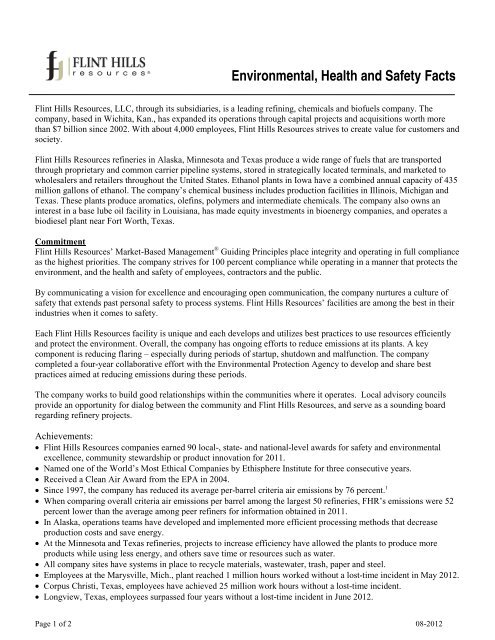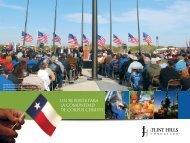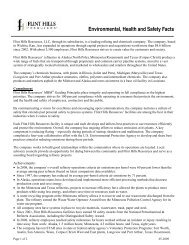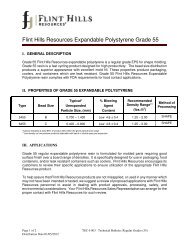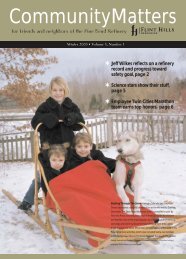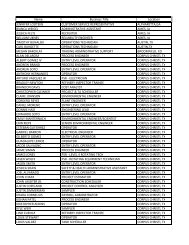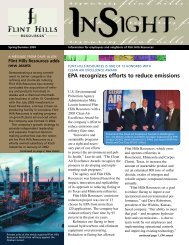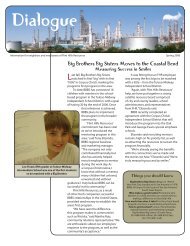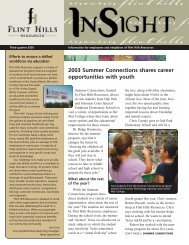Front Page -- fhr - Flint Hills Resources
Front Page -- fhr - Flint Hills Resources
Front Page -- fhr - Flint Hills Resources
Create successful ePaper yourself
Turn your PDF publications into a flip-book with our unique Google optimized e-Paper software.
Environmental, Health and Safety Facts<br />
<strong>Flint</strong> <strong>Hills</strong> <strong>Resources</strong>, LLC, through its subsidiaries, is a leading refining, chemicals and biofuels company. The<br />
company, based in Wichita, Kan., has expanded its operations through capital projects and acquisitions worth more<br />
than $7 billion since 2002. With about 4,000 employees, <strong>Flint</strong> <strong>Hills</strong> <strong>Resources</strong> strives to create value for customers and<br />
society.<br />
<strong>Flint</strong> <strong>Hills</strong> <strong>Resources</strong> refineries in Alaska, Minnesota and Texas produce a wide range of fuels that are transported<br />
through proprietary and common carrier pipeline systems, stored in strategically located terminals, and marketed to<br />
wholesalers and retailers throughout the United States. Ethanol plants in Iowa have a combined annual capacity of 435<br />
million gallons of ethanol. The company’s chemical business includes production facilities in Illinois, Michigan and<br />
Texas. These plants produce aromatics, olefins, polymers and intermediate chemicals. The company also owns an<br />
interest in a base lube oil facility in Louisiana, has made equity investments in bioenergy companies, and operates a<br />
biodiesel plant near Fort Worth, Texas.<br />
Commitment<br />
<strong>Flint</strong> <strong>Hills</strong> <strong>Resources</strong>’ Market-Based Management ® Guiding Principles place integrity and operating in full compliance<br />
as the highest priorities. The company strives for 100 percent compliance while operating in a manner that protects the<br />
environment, and the health and safety of employees, contractors and the public.<br />
By communicating a vision for excellence and encouraging open communication, the company nurtures a culture of<br />
safety that extends past personal safety to process systems. <strong>Flint</strong> <strong>Hills</strong> <strong>Resources</strong>’ facilities are among the best in their<br />
industries when it comes to safety.<br />
Each <strong>Flint</strong> <strong>Hills</strong> <strong>Resources</strong> facility is unique and each develops and utilizes best practices to use resources efficiently<br />
and protect the environment. Overall, the company has ongoing efforts to reduce emissions at its plants. A key<br />
component is reducing flaring – especially during periods of startup, shutdown and malfunction. The company<br />
completed a four-year collaborative effort with the Environmental Protection Agency to develop and share best<br />
practices aimed at reducing emissions during these periods.<br />
The company works to build good relationships within the communities where it operates. Local advisory councils<br />
provide an opportunity for dialog between the community and <strong>Flint</strong> <strong>Hills</strong> <strong>Resources</strong>, and serve as a sounding board<br />
regarding refinery projects.<br />
Achievements:<br />
• <strong>Flint</strong> <strong>Hills</strong> <strong>Resources</strong> companies earned 90 local-, state- and national-level awards for safety and environmental<br />
excellence, community stewardship or product innovation for 2011.<br />
• Named one of the World’s Most Ethical Companies by Ethisphere Institute for three consecutive years.<br />
• Received a Clean Air Award from the EPA in 2004.<br />
• Since 1997, the company has reduced its average per-barrel criteria air emissions by 76 percent. 1<br />
• When comparing overall criteria air emissions per barrel among the largest 50 refineries, FHR’s emissions were 52<br />
percent lower than the average among peer refiners for information obtained in 2011.<br />
• In Alaska, operations teams have developed and implemented more efficient processing methods that decrease<br />
production costs and save energy.<br />
• At the Minnesota and Texas refineries, projects to increase efficiency have allowed the plants to produce more<br />
products while using less energy, and others save time or resources such as water.<br />
• All company sites have systems in place to recycle materials, wastewater, trash, paper and steel.<br />
• Employees at the Marysville, Mich., plant reached 1 million hours worked without a lost-time incident in May 2012.<br />
• Corpus Christi, Texas, employees have achieved 25 million work hours without a lost-time incident.<br />
• Longview, Texas, employees surpassed four years without a lost-time incident in June 2012.<br />
<strong>Page</strong> 1 of 2 08-2012
• The terminals group received the Safety Excellence Award from the International Liquid Terminals Association for<br />
two consecutive years. The group received the Platinum Safety Award from the ILTA, its highest honor, in 2010 and<br />
2008.<br />
• Twenty-six fuels and asphalt terminals received the Occupational Excellence Achievement Award and the<br />
Occupational Perfect Record Award from the National Safety Council for performance during 2011.<br />
• The Minnesota refinery has earned the Minnesota Safety Council’s highest safety award, the Award of Honor, for<br />
three consecutive years. It has also earned the Outstanding Achievement Award.<br />
• The company has 13 STAR certified sites in state or federal safety agency’s Voluntary Protection Programs,<br />
including the first in the fuels terminals industry to be honored. The Minnesota refinery has been MNSTAR certified<br />
by the Minnesota Department of Labor and Industry since 2005.<br />
• The company has developed systems to track process safety performance and has contributed to industry and<br />
regulatory agency discussions on ways to improve performance and develop standards.<br />
• Wildlife management programs at the Joliet, Ill., Rosemount, Minn., and Corpus Christi, Texas, sites have received<br />
Wildlife Habitat Council certification. Both the Joliet and Corpus Christi sites have also received Corporate Lands<br />
for Learning certification from WHC.<br />
Leadership Contact<br />
Brad Razook, president & CEO Mark Nichols, vice president, public affairs and government affairs<br />
316-828-5274<br />
For more information, visit www.<strong>fhr</strong>.com<br />
1 Emissions data calculated using publically available data from state or federal environmental departments.<br />
<strong>Page</strong> 2 of 2 08-2012


